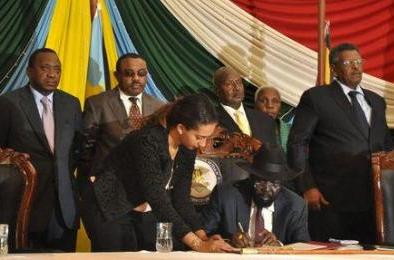Juba urges S. Sudanese to support peace deal signed by president Kiir
August 27, 2015 (JUBA) – South Sudanese government has urged the citizens of the young nation to fully support the IGAD compromise peace agreement, which president Salva Kiir signed on Wednesday, 26 August, in what seemed to be a complete U-turn barely a week after the same government mobilized citizens to reject the deal.

“The signing of the compromise peace agreement by the president demonstrates commitment of the government to end the war. Bringing peace to the country has been the primary objective of the government and there is no reason to not stand by the decision made by the president,” foreign minister Marial told reporters in Juba on Thursday.
“It is now time to start working together for our country to support the institutions we have elected and put in place the programs that you voted for us to put in place. Our people need to congratulate the president for the signing of the agreement,” he said.
The top South Sudanese diplomat also urged the other stakeholders as well as member states in the region and the international community at large to provide support for implementation of the agreement, raising hopes of possibility of ending more than 20 months long conflict.
Daniel Awet Akot, a leading member of the ruling Sudan People’s Liberation Movement (SPLM) also told Sudan Tribune in a separate interview that it was important to sign the peace agreement and silent the guns, describing it as an historic moment.
“What happened yesterday [Wednesday] was a historic moment in the history of this country. The signing of the compromise peace agreement marks the first critical step in silencing the guns,” Akot said.
Akot however warned that signing the deal was not an end in itself but a critical step in the process of ending the war and begin the work of reconciliation, peaceful coexistence and to unite the people of the country.
In a separate statement to the media, Lam Akol, leader of the national alliance of major political parties in South Sudan, commended the president for signing the deal, stressing that peace was what the people have been yearning to get.
Akol, in his capacity as the leader of the official opposition group pledged his support to the government to realise implementation of the deal.
The top opposition leader said no effort should be spared to implement peace due to what he described as “irrational fear” in the government, warning that there are “many spoilers of peace” in the government and on the side of the armed opposition faction led by the designated first vice president, Riek Machar.
The sudden change of tone by the senior government officials, observers say, is an indication that Juba was positively succumbing to the pressure exerted by the international community.
According to the agreement, there will be a pre-transitional period of three months during which the parties should prepare for a formation of transitional government of national unity which will run the country for the next two and a half years until elections are conducted.
A series of processes will be taking place within the three months of the pre-transitional period in preparation for the formation of the transitional unity government.
The designated first vice president, Machar, is expected to arrive in Juba by end of November to take oath of office and then he and president Kiir will form their government based on the power sharing ratio deal.
In the meantime, Juba will be demilitarized in 90 days and its security will be taken care of by a joint integrated police force of the same size to be selected from the two warring forces with assistance of the United Nations Mission in South Sudan (UNMISS).
(ST)
